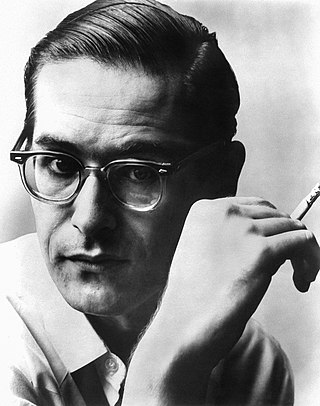
William John Evans was an American jazz pianist and composer who worked primarily as the leader of his trio. His use of impressionist harmony, block chords, innovative chord voicings, and trademark rhythmically independent, "singing" melodic lines continue to influence jazz pianists today.
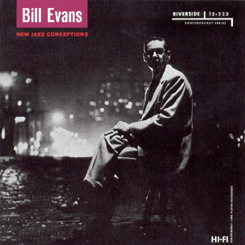
New Jazz Conceptions is the debut album by jazz pianist Bill Evans, recorded in two sessions during September 1956 for Riverside Records.
Edwin James Costa was an American jazz pianist, vibraphonist, composer and arranger. In 1957, he was chosen as DownBeat jazz critics' new star on piano and vibes – the first time that one artist won two categories in the same year. He became known for his percussive, driving piano style that concentrated on the lower octaves of the keyboard.

Gershwin's World is a thirty-seventh studio album by the American jazz pianist Herbie Hancock.

Everybody Digs Bill Evans is a trio and solo album by jazz pianist Bill Evans. It was released in early 1959 on the Riverside Records label.

You Must Believe in Spring is an album by American jazz pianist Bill Evans, recorded by him with bassist Eddie Gómez and drummer Eliot Zigmund in August 1977 and released in February 1981, shortly after Evans's death in September 1980.
Gary Ronald McFarland was an American composer, arranger, conductor, vibraphonist, and vocalist. He recorded for the jazz imprints Verve and Impulse! Records during the 1960s. DownBeat magazine said he made "one of the more significant contributors to orchestral jazz". A 2015 review of a McFarland DVD documentary called him "one of the busiest New York jazz arrangers of the 1960s". The review further stated that McFarland's "ascendance coincided with the rise of bossa nova, and McFarland was adept at translating the mercurial song form into orchestrations. He wrote some beautiful orchestral settings for great soloists, yet wasn't immune to commercial forces."
Marty Morell is a jazz drummer who was a member of the Bill Evans Trio for seven years—longer than any other drummer. Before joining Evans, he worked with the Al Cohn-Zoot Sims Quintet, Red Allen, Gary McFarland, Steve Kuhn, and Gábor Szabó.

Alone is a solo piano album by jazz musician Bill Evans, recorded in the fall of 1968 for Verve Records, featuring a particularly notable 14+-minute performance of the jazz standard "Never Let Me Go." Evans contributed notes to the album, including the following statement:
Perhaps the hours of greatest pleasure in my life have come about as a result of the capacity of the piano to be in itself a complete expressive musical medium. In retrospect, I think that these countless hours of aloneness with music unified the directive energy of my life. At those times when I have achieved this sense of oneness while playing alone, the many technical or analytic aspects of the music happened of themselves with positive rightness which always served to remind me that to understand music most profoundly one only has to be listening well. Perhaps it is a peculiarity of mine that despite the fact that I am a professional performer, it is true that I have always preferred playing without an audience. This has nothing to do with my desire to communicate or not, but rather I think just a problem of personal self-consciousness which had to be conquered through discipline and concentration. Yet, to know one is truly alone with one’s instrument and music has always been an attractive and conducive situation for me to find my best playing level. Therefore, what I desired to present in a solo piano recording was especially this unique feeling.

I Will Say Goodbye is an album by American jazz pianist Bill Evans, recorded in 1977 but not released until January 1980. It was his final album for Fantasy Records, making the title quite appropriate.
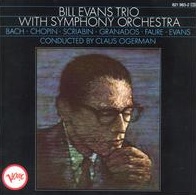
Bill Evans Trio with Symphony Orchestra is an album by American jazz pianist Bill Evans and his trio, released in 1966, featuring jazz arrangements of works by classical composers Granados, J.S. Bach, Scriabin, Fauré, and Chopin. The group is accompanied by an orchestra arranged and conducted by Claus Ogerman. Originals by both Evans and Ogerman are also included.
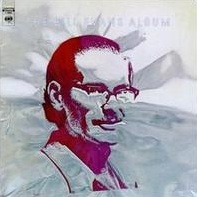
The Bill Evans Album is a recording by the jazz pianist Bill Evans, released in 1971 on the Columbia label. It was his first album to feature all compositions written, arranged, and performed by him. On the record, Evans plays both an acoustic and a Fender Rhodes electric piano.

Quintessence is an album by American jazz pianist Bill Evans. It was recorded in 1976 for Fantasy Records and released the following year. At this time usually playing solo or with his trio, for these sessions Evans was the leader of an all-star quintet featuring Harold Land on tenor saxophone, guitarist Kenny Burrell, Ray Brown on bass, and Philly Joe Jones on drums.

The Tokyo Concert is a live album by jazz pianist Bill Evans with bassist Eddie Gómez and drummer Marty Morell recorded at the Yūbin Chokin Hall in Tokyo, Japan, in 1973 and released on the Fantasy label.
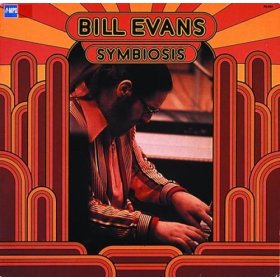
Symbiosis is an album by jazz pianist Bill Evans with an orchestra playing a two-movement work composed by conductor Claus Ogerman, recorded in February 1974 and originally released on the German MPS label.

Profiles is a live album by American jazz vibraphonist Gary McFarland featuring performances recorded at the Lincoln Centre Philharmonic Hall in 1966 for the Impulse! label.
Time Remembered is a modal jazz standard composed by jazz pianist Bill Evans.

Hot House is the seventh recording by vibraphonist Gary Burton and pianist Chick Corea released in March 2012 from Concord Jazz label. It received Grammy Award nominations in Best Jazz Instrumental Album, and the title track "Hot House" won the Best Improvised Jazz Solo.

Big Band Bossa Nova is a 1962 album by saxophonist Stan Getz with the Gary McFarland Orchestra. The album was arranged and conducted by Gary McFarland and produced by Creed Taylor for Verve Records. This was Getz's second bossa nova album for Verve following Jazz Samba, his very successful collaboration with guitarist Charlie Byrd.
"Funkallero" is a jazz standard composed by the pianist Bill Evans in the mid 1950s. Evans biographer Peter Pettinger notes that it bears "more than a passing resemblance to Bud Powell's 'Un Poco Loco.'" Evans himself said of his composition, "I was getting into kind of a swing thing, and this line just naturally came out of that feeling. It's a natural vehicle for blowing."















